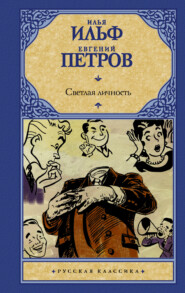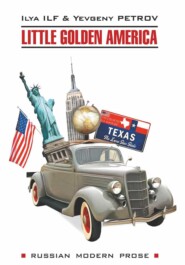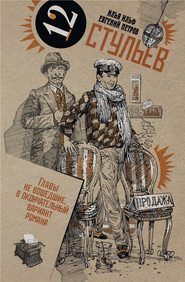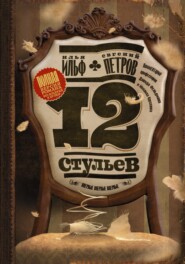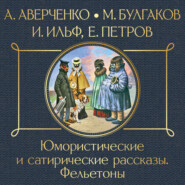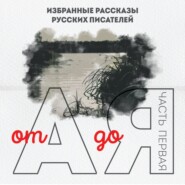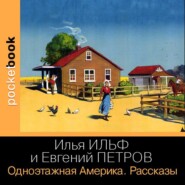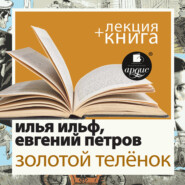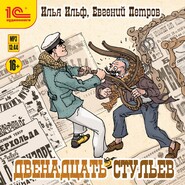По всем вопросам обращайтесь на: info@litportal.ru
(©) 2003-2025.
✖
The Twelve Chairs / Двенадцать стульев. Книга для чтения на английском языке
Автор
Жанр
Год написания книги
1928
Теги
Настройки чтения
Размер шрифта
Высота строк
Поля
The moment a passenger approaches the right of way, which he amateurishly calls a railway station, his life is completely changed. He is immediately surrounded by predatory porters with white aprons and nickel badges on their chests, and his luggage is obsequiously picked up. From that moment, the citizen no longer is his own master. He is a passenger and begins to perform all the duties of one. These duties are many, though they are not unpleasant.
Passengers eat a lot. Ordinary mortals do not eat during the night, but passengers do. They eat fried chicken, which is expensive, hardboiled eggs, which are bad for the stomach, and olives. Whenever the train passes over the points, numerous teapots in the rack clatter together, and legless chickens (the legs have been torn out by the roots by passengers) jump up and down in their newspaper wrapping.
The passengers, however, are oblivious of all this. They tell each other jokes. Every three minutes the whole compartment rocks with laughter; then there is a silence and a soft-spoken voice tells the following story:
«An old Jew lay dying. Around him were his wife and children. ‘Is Monya here?' asks the Jew with difficulty. ‘Yes, she's here.' ‘Has Auntie Brana come?' ‘Yes.' ‘And where's Grandma? I don't see her.' ‘She's over here.' ‘And Isaac?' ‘He's here, too.' ‘What about the children?' They're all here.' ‘Then who's minding the shop?'»
This very moment the teapots begin rattling and the chickens fly up and down in the rack, but the passengers do not notice. Each one has a favourite story ready, eagerly awaiting its turn. A new raconteur, nudging his neighbours and calling out in a pleading tone, «Have you heard this one?» finally gains attention and begins:
«A Jew comes home and gets into bed beside his wife. Suddenly he hears a scratching noise under the bed. The Jew reaches his hand underneath the bed and asks: „Is that you, Fido?“ And Fido licks his hand and says: „Yes, it's me.“»
The passengers collapse with laughter; a dark night cloaks the countryside. Restless sparks fly from the funnel, and the slim signals in their luminous green spectacles flash snootily past, staring above the train.
An interesting thing, the right of way! Long, heavy trains race to all' parts of the country. The way is open at every point. Green lights can be seen everywhere; the track is clear. The polar express goes up to Murmansk. The K-l draws out of Kursk Station, bound for Tiflis, arching its back over the points. The far-eastern courier rounds Lake Baikal and approaches the Pacific at full speed.
The Muse of Travel is calling. She has already plucked Father Theodore from his quiet regional cloister and cast him into some unknown province. Even Ippolit Matveyevich Vorobyaninov, former marshal of the nobility and now clerk in a registry office, is stirred to the depths of his heart and highly excited at the great things ahead.
People speed all over the country. Some of them are looking for scintillating brides thousands of miles away, while others, in pursuit of treasure, leave their jobs in the post office and rush off like schoolboys to Aldan. Others simply sit at home, tenderly stroking an imminent hernia and reading the works of Count Salias, bought for five kopeks instead of a rouble.
The day after the funeral, kindly arranged by Bezenchuk the undertaker, Ippolit Matveyevich went to work and, as part of the duties with which he was charged, duly registered in his own hand the demise of Claudia Ivanovna Petukhov, aged fifty-nine, housewife, non-party-member, resident of the regional centre of N., by origin a member of the upper class of the province of Stargorod. After this, Ippolit Matveyevich granted himself a two-week holiday due to him, took forty-one roubles in salary, said goodbye to his colleagues, and went home. On the way he stopped at the chemist's.
The chemist, Leopold Grigorevich, who was called Lipa by his friends and family, stood behind the red-lacquered counter, surrounded by frosted-glass bottles of poison, nervously trying to sell the fire chief's sister-in-law «Ango cream for sunburn and freckles-gives the skin an exceptional whiteness». The fire chief's sister-in-law, however, was asking for «Rachelle powder, gold in colour-gives the skin a tan not normally acquirable». The chemist had only the Ango cream in stock, and the battle between these two very different cosmetics raged for half an hour. Lipa won in the end and sold the fire chief's sister-in-law some lipstick and a bugovar, which is a device similar in principle to the samovar, except that it looks like a watering-can and catches bugs.
«What can I get you?»
«Something for the hair».
«To make it grow, to remove it, or to dye it?»
«Not to make it grow», said Ippolit Matveyevich. «To dye it».
«We have a wonderful hair dye called Titanic. We got it from the customs people; it was confiscated. It's a jet black colour. A bottle containing a six months' supply costs three roubles, twelve kopeks. I can recommend it to you, as a good friend».
Ippolit Matveyevich twiddled the bottle in his hands, looked at the label with a sigh, and put down his money on the counter.
He went home and, with a feeling of revulsion, began pouring Titanic onto his head and moustache. A stench filled the house.
By the time dinner was over, the stench had cleared, the moustache had dried and become matted and was very difficult to comb. The jet-black colour turned out to have a greenish tint, but there was no time for a second try.
Taking from his mother-in-law's jewel box a list of the gems, found the night before, Ippolit Matveyevich counted up his cash-in-hand, locked the house, put the key in his back pocket and took the no. 7 express to Stargorod.
Chapter Five. The Smooth Operator
At half past eleven a young man aged about twenty-eight entered Stargorod from the direction of the village of Chmarovka, to the north-east. A waif ran along behind him.
«Mister!» cried the boy gaily, «gimme ten kopeks!»
The young man took a warm apple out of his pocket and handed it to the waif, but the child still kept running behind. Then the young man stopped and, looking ironically at the boy, said quietly:
«Perhaps you'd also like the key of the apartment where the money is?»
The presumptuous waif then realized the complete futility of his pretensions and dropped behind.
The young man had not told the truth. He had no money, no apartment where it might have been found, and no key with which to open it. He did not even have a coat. The young man entered the town in a green suit tailored to fit at the waist and an old woollen scarf wound several times around his powerful neck. On his feet were patent-leather boots with orange-coloured suede uppers. He had no socks on. The young man carried an astrolabe.
Approaching the market, he broke into a song: «O, Bayadere, tum-ti-ti, tum-ti-ti».
In the market he found plenty going on. He squeezed into the line of vendors selling wares spread out on the ground before them, stood the astrolabe in front of him and began shouting:
«Who wants an astrolabe? Here's an astrolabe going cheap. Special reduction for delegations and women's work divisions!»
At first the unexpected supply met with little demand; the delegations of housewives were more interested in obtaining commodities in short supply and were milling around the cloth and drapery stalls. A detective from the Stargorod criminal investigation department passed the astrolabe-vendor twice, but since the instrument in no way resembled the typewriter stolen the day before from the Central Union of Dairy Cooperatives, the detective stopped glaring at the young man and passed on.
By lunchtime the astrolabe had been sold to a repairman for three roubles.
«It measures by itself», he said, handing over the astrolabe to its purchaser, «provided you have something to measure».
Having rid himself of the calculating instrument, the happy young man had lunch in the Tasty Corner snack bar, and then went to have a look at the town. He passed along Soviet Street, came out into Red Army Street (previously Greater Pushkin Street), crossed Cooperative Street and found himself again on Soviet Street. But it was not the same Soviet Street from which he had come. There were two Soviet Streets in the town. Greatly surprised by this fact, the young man carried on and found himself in Lena Massacre Street (formerly Denisov Street). He stopped outside no. 28, a pleasant two-storeyed private house, which bore a sign saying:
USSR RSFSR SECOND SOCIAL SECURITY HOME
OF THE STAR-PROV-INS-AD
and requested a light from the caretaker, who was sitting by the entrance on a stone bench.
«Tell me, dad», said the young man, taking a puff, «are there any marriageable young girls in this town?
The old caretaker did not show the least surprise.
„For some a mare'd be a bride,“ he answered, readily striking up a conversation.
„I have no more questions,“ said the young man quickly. And he immediately asked one more: „A house like this and no girls in it?“
„It's a long while since there've been any young girls here,“ replied the old man. „This is a state institution-a home for old-age women pensioners“.
„I see. For ones born before historical materialism?“
„That's it. They were born when they were born“.
„And what was here in the house before the days of historical materialism?“
„When was that?“
„In the old days. Under the former regime“.
„Oh, in the old days my master used to live here“.
„A member of the bourgeoisie“)»






